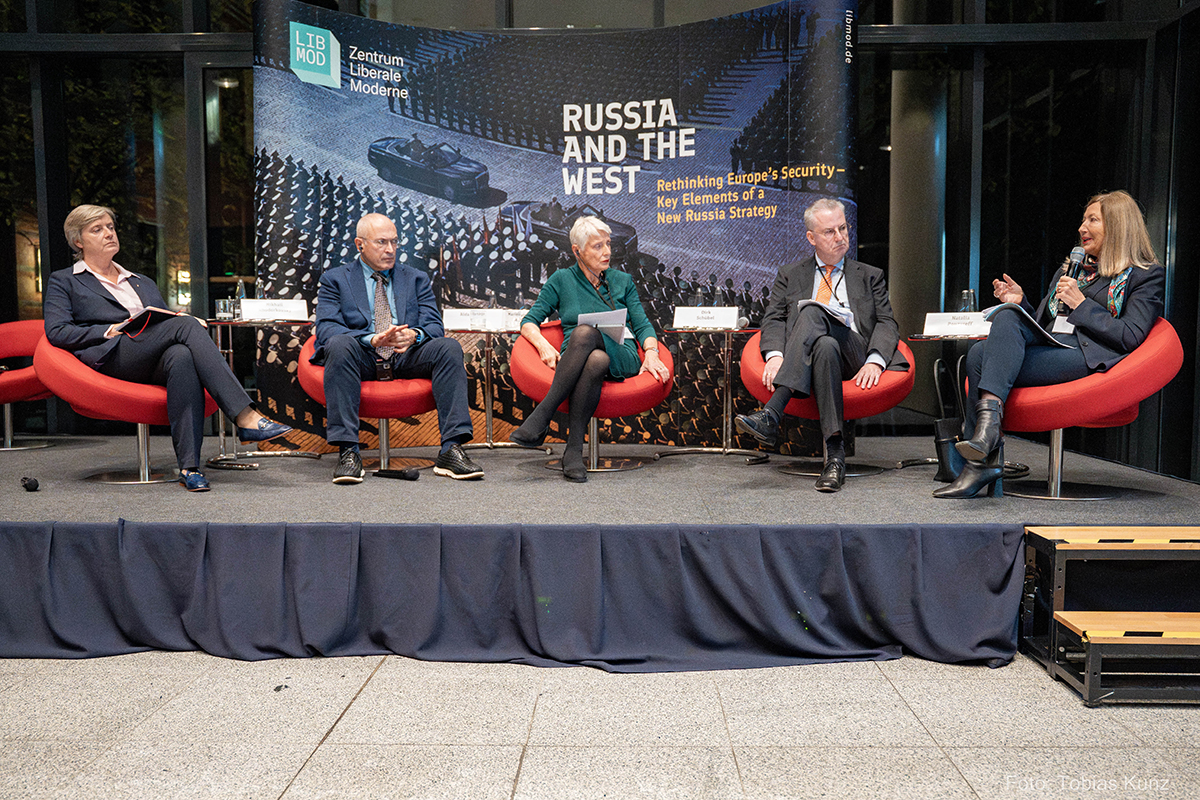Towards a basic income for lifelong learning

We are living in times of rapid change: climate change, digitalization, the COVID-19 pandemic, the looming systemic competition with China, global migration, and the realignment of globalization are changing our world. Each of those poses their own challenges, but they also mutually reinforce each other.
Change is a characteristic of the modern age. But the current change is faster than before, and it comes with insecurities for broader parts of the population. There is an increasing desire for consistent security and belonging. To be able to risk change, a certain “security corridor” is needed. This is what we call “security in times of rapid change.”
Politics must play a role
Politics must provide people with security in times of rapid change. Therefore, politicians are called upon to find answers. The answers should include two things: First, they must offer solutions to the challenges outlined, and second, they must give people “security in times of rapid change.” This security, which allows people to be in control of and shape their own lives even in phases of rapid change,– is also important for democracy. In this way, democracy can (and must!) prove that it is capable of acting (Center for Liberal Modernity, 2019).
How can security in times of rapid change be achieved? The megatrends described above have a massive impact on our economy and the way we live and work. Studies show that over 50% of all existing jobs will change in the next ten to 15 years, and some will no longer exist. The Covid-19 pandemic accelerated processes that started before, especially in technology adaption (see, for example, World Economic Forum 2020).
This makes education and lifelong learning even more important areas than ever before. While there are lots of policy instruments to foster primary and secondary education, lifelong learning is not the focus of policymakers in most countries. It is mostly left to individuals and companies, who do a lot – in Germany, they finance 2/3 of lifelong learning activities alone. But this is not enough: Climate change, digitalization, systemic competition, and the reconfiguration of globalization will cause tremendous structural changes in the ways we live, work, and produce. It will, for most citizens, no longer be enough to be trained and then remain in one occupation for their entire working lives.
We need a basic income for lifelong learning
What is needed is a broad initiative to foster lifelong learning. We, therefore, propose making massive investments in this area and granting every citizen a basic education income for lifelong learning. This instrument can be designed differently for each country. I will describe it for the case of Germany.
The basic education income proposed here combines a legal right to further education with a concrete financing instrument. It grants every adult citizen up to three years of state-financed further education. This instrument allows people to change careers during the course of their working lives and enables them to learn something completely new or to renew their competencies in certain areas. They can decide on their own in which area they want to specialize if they want to learn something completely new or even do a bachelor’s or master’s degree.
A legal right to continuing education should apply to all people of working age. A legal entitlement is enforceable; it gives citizens a strong position vis-à-vis the state. A right to continuing education anchors the issue in people’s minds.
People need the chance to change careers and to learn something new
The demand for a legal right to continuing education is widespread, both politically and in the professional community in Germany and beyond. However, it is of little use if it is not linked to concrete instruments. Central to this is the question of financing.
The Center for Liberal Modernity, therefore, has proposed a basic income for lifelong learning and has modeled it on the German case. It should be available to all people between the ages of 25 and 65, i.e., during their active working phase, for job-related or professional further education.
They should be able to take advantage of this basic education income for up to three years over the course of their working lives, either in whole or in part. Part-time training would be possible, but the initial training and purely company-based further training would be excluded, as well as training courses that are solely for private development and cannot be used for work. These restrictions are justified because the basic education income would be financed from tax revenues (see below). In such financing, a balance must be found between added value and individual benefit.
We propose a basic amount of 1200 euros net per month. This amount would allow low-income earners to make very few cuts but would force higher-income earners to spend part of their savings to maintain their standard of living. This can be justified because it is a state investment with an impact on society as a whole, but it can also have positive effects for the individual – less unemployment, a higher lifetime income, more life satisfaction. In addition, supplements would be provided for children or impairments, e.g. 200 euros per child. Social security contributions and course and material costs would also be covered. A minimum claim period of three months at a time would ensure that the administrative costs and benefits of continuing education are not out of proportion.
In order to make lifelong learning accessible to broader sections of the population, a number of other measures are needed in addition to a legal entitlement and a simple financing instrument, including accessible consulting, quality checks, and mainstreaming of the market for further education. These would help to make continuing education more accessible, and to ensure and improve the quality of the programs. It is important for the idea of a legal right that people are not bound to the guidance given. They are free to decide whatever training they want to make within the portfolio of the basic income for lifelong learning.
States should invest heavily in further education
It is difficult to foresee exactly what the costs of a basic education income would be. It is still unclear to what extent it would be taken up if it were a simple, easy-to-understand, and available instrument. We assume that far more people would opt for substantial, job-ready training than they do now if a basic income for lifelong learning were available. This is evident on the cost side, but also on the benefit side. The fact that continuing education can help significantly in coping with the upcoming structural change in our economy and working world justifies government investment to a much greater extent than before.
For Germany, the economic research company Prognose calculated two scenarios that assume that each year one percent of those entitled to it – around 367,000 people – take up a basic education income for an average of four and seven months respectively. Including living expenses, course costs, and social security contributions, the calculations arrive at a range of between 7 and 14 billion euros annually (Center for Liberal Modernity 2021).
A basic education income would be a strong government investment in minds. But the political and social consensus is necessary. The call to establish a legal right to continuing education must also be widely shared politically. The basic income for lifelong learning would be a strong investment in the future – an investment that also entails costs. However, these costs could be offset, at least in part. What is the value? It will empower people to take care of their own lives and career, help to prevent unemployment, foster economic growth and innovation, help regulate migration and help stabilize democracy by providing policies that empower citizens.
A basic education income can help not only to cushion structural change in the labor market but also to make it possible to shape it – both politically and individually. This can lead to lower spending on (long-term) unemployment and thus to higher tax and social security revenues. These two effects would also help to amortize the costs of a basic education income in the medium term.
A basic income for lifelong learning would help democracy to deliver
A basic income for lifelong learning has great potential. It is a flexible instrument that allows for quick reactions to changes in the economy, skill sets, and the labor market. Tying a financing instrument to a citizen’s right to continuing education offers a way to galvanize comprehensive political support for the continuing education sector. By being unbureaucratic, easy to understand, widely applicable, and linked to non-binding but competent guidance, the instrument has the potential to significantly increase participation in continuing education. What’s more, it promotes participation in continuing education and, beyond that, in society.
This also has repercussions for our democracy: if people feel they can take responsibility for their own lives, their approval of democracy increases. The argument also works the other way around: democracy is only successful in the long term if it “delivers,” i.e., gives people the opportunity to develop. It must offer people “security in times of rapid change,” even and especially in times of major change. A basic education income can be a building block for this.
The proposed instrument is a suitable model for developed countries with a solid basic education and financial resources. Here, states can invest larger amounts also in further education. But it is also a model that can be applied to different national and supranational contexts. The G20 can promote such an instrument, create funds to finance it, and allocate the money to the areas where it is needed most. The challenges described in the beginning, namely climate change, digitalization, and global migration, are affecting the Global South and developing countries even more.
Thus, the international community can take on responsibility and create funds to foster lifelong learning worldwide. The basic income for lifelong learning can be a model for such funds.
This can be used in addition to the much-criticized microcredit system (see Chliova et al. 2015 for a meta-analysis). While microcredits start with the under-financialization of people, a basic income for lifelong learning assesses the skills people have or can obtain. Both are much needed, especially in developing societies and both help empower people to lead their own lives.
References
Center for Liberal Modernity (2021): Basic Income for Lifelong Learning. Proposal for a new financing of continuing education. German: Zentrum Liberale Moderne (2021): Das Bildungsgrundeinkommen. Vorschlag für eine neue Weiterbildungsfinanzierung. https://libmodredaktion.fra1.digitaloceanspaces.com/wp-content/uploads/20240905144340/LibMod_Bildungsgrundeinkommen.pdf
Center for Liberal Modernity (2019). Security in Transition. Social Cohesion in Times of Stormy Change. German: Zentrum Liberale Moderne (2019). Sicherheit im Wandel. Gesellschaftlicher Zusammenhalt in Zeiten stürmischer Veränderung. https://libmod.de/der-bericht-der-expertenkommission-sicherheit-im-wandel/
Chliova, Myrto; Brinckmann, Jan; Rosenbusch, Nina (2015): Is microcredit a blessing for the poor? A meta-analysis examining development outcomes and contextual considerations. In: Journal of Business Venturing 30(3), pp. 467–487. https://doi.org/10.1016/j.jbusvent.2014.10.003
World Economic Forum (2020): The future of Jobs Report 2020. https://www3.weforum.org/docs/WEF_Future_of_Jobs_2020.pdf
![]()
Hat Ihnen unser Beitrag gefallen? Dann spenden Sie doch einfach und bequem über unser Spendentool. Sie unterstützen damit die publizistische Arbeit von LibMod.
Spenden mit Bankeinzug
Spenden mit PayPal
Wir sind als gemeinnützig anerkannt, entsprechend sind Spenden steuerlich absetzbar. Für eine Spendenbescheinigung (nötig bei einem Betrag über 200 EUR), senden Sie Ihre Adressdaten bitte an finanzen@libmod.de
Verwandte Themen
Newsletter bestellen
Mit dem LibMod-Newsletter erhalten Sie regelmäßig Neuigkeiten zu unseren Themen in Ihr Postfach.





